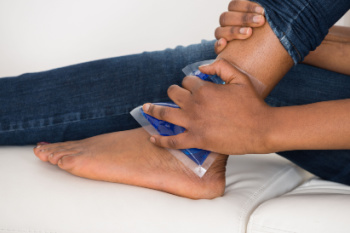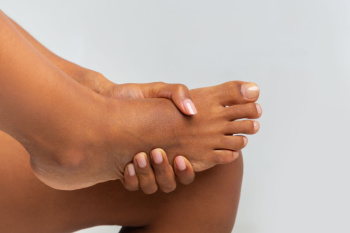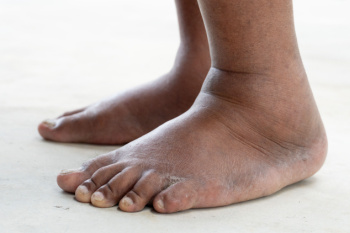
Ankle injuries, including sprains, strains, and fractures, are common and can range from mild to severe. Treatment depends on the type and extent of the injury. For minor sprains, rest, compression, and elevation can be effective. Supportive bracing and gentle stretching may follow once swelling decreases. More serious injuries may require immobilization in a boot or cast, especially if ligaments are torn or bones are fractured. Specific stretches can help to restore strength, balance, and range of motion. In rare cases, surgery may be needed to repair severe ligament damage or unstable fractures. Prompt attention and a clear treatment plan support better recovery and help prevent chronic instability or future injury. If you have ankle pain, swelling, or difficulty bearing weight after an injury, it is suggested you see a podiatrist for a diagnosis and appropriate treatment.
Ankle pain can be caused by a number of problems and may be potentially serious. If you have ankle pain, consult with the foot specialists from Certified Foot Care. Our doctors will assess your condition and provide you with quality foot and ankle treatment.
Ankle pain is any condition that causes pain in the ankle. Due to the fact that the ankle consists of tendons, muscles, bones, and ligaments, ankle pain can come from a number of different conditions.
Causes
The most common causes of ankle pain include:
- Types of arthritis (rheumatoid, osteoarthritis, and gout)
- Ankle sprains
- Broken ankles
- Achilles tendonitis
- Achilles tendon rupture
- Stress fractures
- Bursitis
- Tarsal tunnel syndrome
- Plantar fasciitis
Symptoms
Symptoms of ankle injury vary based upon the condition. Pain may include general pain and discomfort, swelling, aching, redness, bruising, burning or stabbing sensations, and/or loss of sensation.
Diagnosis
Due to the wide variety of potential causes of ankle pain, podiatrists will utilize a number of different methods to properly diagnose ankle pain. This can include asking for personal and family medical histories and of any recent injuries. Further diagnosis may include sensation tests, a physical examination, and potentially x-rays or other imaging tests.
Treatment
Just as the range of causes varies widely, so do treatments. Some more common treatments are rest, ice packs, keeping pressure off the foot, orthotics and braces, medication for inflammation and pain, and surgery.
If you have any questions, please feel free to contact our offices located in Larchmont and Brooklyn, NY . We offer the newest diagnostic and treatment technologies for all your foot care needs.

Foot health is essential, yet often neglected, and keeping your feet clean is key to preventing bacterial, fungal, and microbial infections. Feet are vulnerable to conditions like athlete’s foot, toenail fungus, and other infections due to moisture, poor hygiene, and tight shoes. Without proper care, these infections can thrive, causing itching, redness, swelling, and a strong odor. Skin may crack or blister, and toenails can thicken, discolor, or become brittle. To prevent these issues, it is important to regularly wash and thoroughly dry your feet, especially between the toes, to eliminate excess moisture where bacteria and fungi grow. Wearing clean socks and breathable shoes also helps keep your feet healthy. A podiatrist can help diagnose and treat infections with antifungal medications and offer advice on foot hygiene and prevention. If you notice any foot problems or suspect an infection, it is suggested that you make an appointment with a podiatrist to protect your feet and overall health.
Everyday foot care is very important to prevent infection and other foot ailments. If you need your feet checked, contact the foot specialists from Certified Foot Care. Our doctors can provide the care you need to keep you pain-free and on your feet.
Everyday Foot Care
Often, people take care of their bodies, face and hair more so than they do for their feet. But the feet are a very important aspect of our bodies, and one that we should pay more attention to. Without our feet, we would not be able to perform most daily tasks.
It is best to check your feet regularly to make sure there are no new bruises or cuts that you may not have noticed before. For dry feet, moisturizer can easily be a remedy and can be applied as often as necessary to the affected areas. Wearing shoes that fit well can also help you maintain good foot health, as well as making it easier to walk and do daily activities without the stress or pain of ill-fitting shoes, high heels, or even flip flops. Wearing clean socks with closed shoes is important to ensure that sweat and bacteria do not accumulate within the shoe. Clean socks help to prevent Athlete’s foot, fungi problems, bad odors, and can absorb sweat.
If you have any questions please feel free to contact our offices located in Larchmont and Brooklyn, NY . We offer the newest diagnostic and treatment technologies for all your foot and ankle needs.

Swollen feet can be a sign of various underlying medical conditions that affect the body’s ability to manage fluid balance. During pregnancy, hormonal changes and increased pressure on blood vessels can cause fluid retention, leading to noticeable swelling in the feet and ankles. Heart conditions such as congestive heart failure may impair circulation, allowing fluid to accumulate in the lower extremities. When kidney function is reduced, the body may struggle to eliminate excess fluid and sodium, contributing to swelling. Liver disease can also lead to fluid buildup due to decreased production of proteins that regulate blood volume. Additionally, poor circulation, often from conditions like venous insufficiency, can prevent blood from flowing effectively back to the heart. If you have swollen feet, it is suggested that you visit a podiatrist who can offer you effective relief and management methods.
Swollen feet can be a sign of an underlying condition. If you have any concerns, contact the foot specialists of Certified Foot Care. Our doctors can provide the care you need to keep you pain-free and on your feet.
Swollen feet are a common ailment among pregnant women and people who stand or sit for extended periods. Aging may increase the possibility of swollen feet and patients who are obese often notice when their feet are swelling too. There may be medical reasons why swollen feet occur:
- Phlebitis - A condition that causes the veins to become inflamed and can also cause leg pain.
- Liver disease - This may lead to low blood levels of albumin which is a protein. This can cause fluid in the blood to pass into the tissues and several areas of the body can become swollen.
- Heart failure - When the heart doesn’t pump properly the blood that is normally pumped back to the heart can pool in the veins of the legs causing swollen feet.
- Kidney disease - One of the main functions of the kidneys is releasing excess fluid in the body. This type of condition can make it difficult for the kidneys to function properly, and as a result the feet may become swollen.
- Deep-vein thrombosis (DVT)- This is a serious condition where blood clots form in the veins of the legs. They can block the return of blood from the legs to the heart which may cause the feet to swell. It is important to be treated by a podiatrist if this condition is present.
Swollen feet can also be caused by bone and tendon conditions, including fractures, arthritis, and tendinitis. Additionally, there may be skin and toenail conditions and an infection may cause the feet to swell. Patients who take medicine to treat high blood pressure may be prone to getting swollen feet.
Many patients elevate their feet to help relieve the swelling and this is generally a temporary remedy. When a podiatrist is consulted the reason behind the swelling can be uncovered and subsequently treated.
If you have any questions please feel free to contact our offices located in Larchmont and Brooklyn, NY . We offer the newest diagnostic tools and technology to treat your foot and ankle needs.

